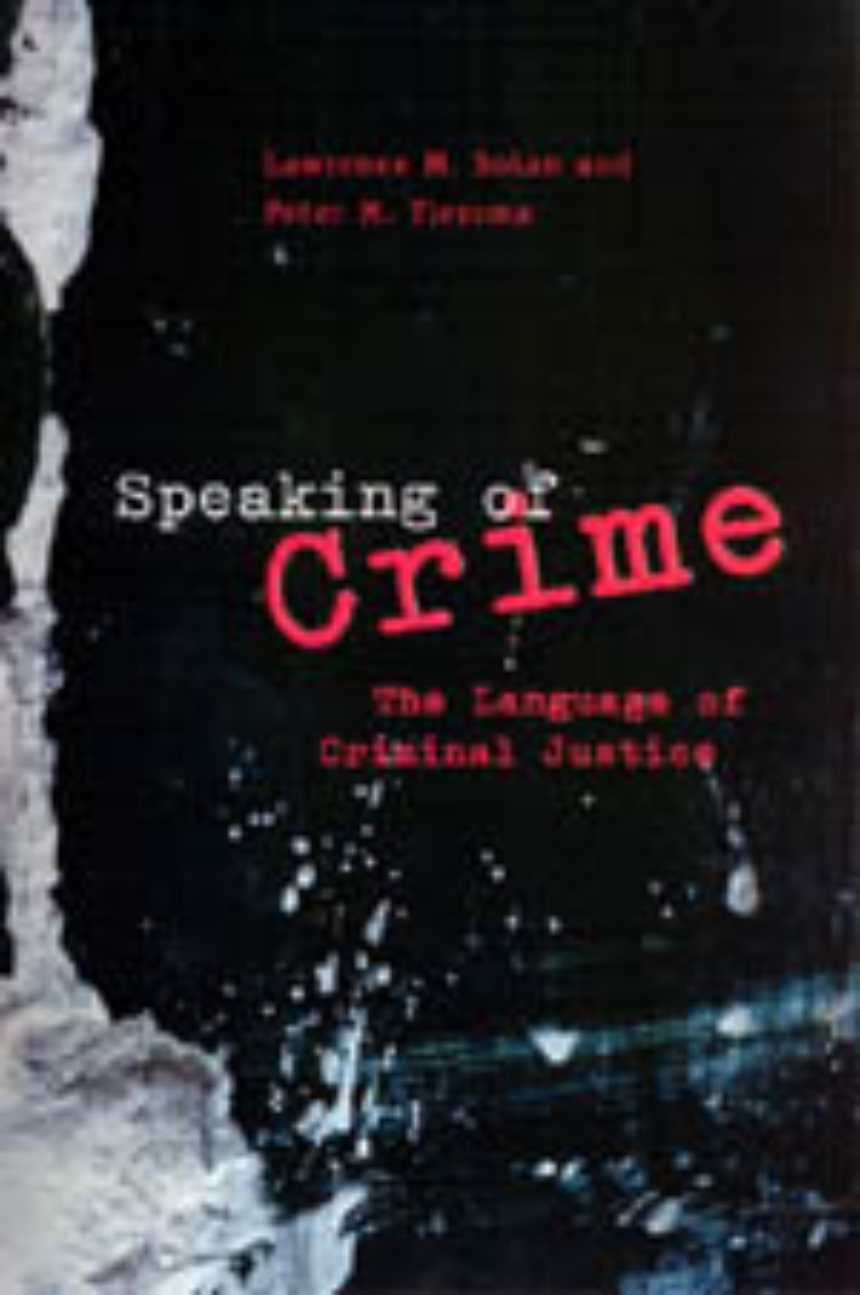Speaking of Crime
The Language of Criminal Justice
Why do so many people voluntarily consent to searches by have the police search their person or vehicle when they know that they are carrying contraband or evidence of illegal activity? Does everyone understand the Miranda warning? How well can people recognize a voice on tape? Can linguistic experts identify who wrote an anonymous threatening letter?
Speaking of Crime answers these questions and examines the complex role of language within our criminal justice system. Lawrence M. Solan and Peter M. Tiersma compile numerous cases, ranging from the Lindbergh kidnapping to the impeachment trial of Bill Clinton to the JonBenét Ramsey case, that provide real-life examples of how language functions in arrests, investigations, interrogations, confessions, and trials. In a clear and accessible style, Solan and Tiersma show how recent advances in the study of language can aid in understanding how legal problems arise and how they might be solved.
With compelling discussions current issues and controversies, this book is a provocative state-of-the-art survey that will be of enormous value to legal scholars and professionals throughout the criminal justice system.
Speaking of Crime answers these questions and examines the complex role of language within our criminal justice system. Lawrence M. Solan and Peter M. Tiersma compile numerous cases, ranging from the Lindbergh kidnapping to the impeachment trial of Bill Clinton to the JonBenét Ramsey case, that provide real-life examples of how language functions in arrests, investigations, interrogations, confessions, and trials. In a clear and accessible style, Solan and Tiersma show how recent advances in the study of language can aid in understanding how legal problems arise and how they might be solved.
With compelling discussions current issues and controversies, this book is a provocative state-of-the-art survey that will be of enormous value to legal scholars and professionals throughout the criminal justice system.
264 pages | 8 tables | 6 x 9 | © 2004
Chicago Series in Law and Society
Language and Linguistics: Language and Law
Law and Legal Studies: Law and Society, Legal Thought
Reviews
Table of Contents
Acknowledgments
Part I - A Good Time to Study the Language of Criminal Justice
1. Language and the Criminal Law
The Language of Police and Suspects
Linguistic Evidence
Crimes of Language
Some Goals and Limitations
2. Linguistics in the Law
The Subsystems of Language
Word Meaning: Two Ways of Thinking
Discourse and Inferences from Context
Linguistics in the Courts
Linguistics and the Admissibility of Expert Evidence in American Courts
Part II Gathering the Evidence
3. "Consensual" Searches
The Bustamonte Case
Requests versus Commands
Consenting
Racial Profiling
Conclusion
4. Interrogation, Confession, and the Right to Counsel
Invoking the Right to Counsel
The Meaning of "Interrogation"
Interrogation and the Problem of False Confessions
Conclusion
5. Understanding Miranda
The Rise of Miranda
Reading Rights
Suspects with Low Intelligence or Mental Problems
Juveniles
Suspects Whose Native Language Is Not English
Deaf Defendants
How Can Comprehension Be Improved?
Conclusion
Part III - Linguistic Evidence in Court
6. Exact Words
Forget about It: Human Memory for Verbatim Speech
The Legal System’s Response: Substance Is Good Enough
Jailhouse Informants
Language Crimes without the Language
Conclusion
7. Who Said That?
Legal Standards for Identifying Speakers
Voice Recognition Research and the Reliability of Identifications
Expert Speaker Identification
Conclusion
8. Who Wrote That?
Hauptmann and the Document Examiners
Leaving It to the Jury
The Return of the Experts?
Some Promise for an Improved Science of Authorship Attribution
Some Easier Cases
Conclusion
Part IV - Crimes of Language
9. Solicitation, Conspiracy, Bribery
Solicitation
Conspiracy
Bribery
10. Threats
What Constitutes a Threat?
Indirect and Ambiguous Threats
Political Hyperbole
Conclusion
11. Perjury
The Bronston Case
Did Clinton Lie?
Perjury and Lying
Conclusion
12. Where Do We Go from Here?
Law Enforcement
Legislatures and the Executive Branch
Courts
Attorneys
Linguists, Psychologists, and Other Scholars
Notes
Index
Part I - A Good Time to Study the Language of Criminal Justice
1. Language and the Criminal Law
The Language of Police and Suspects
Linguistic Evidence
Crimes of Language
Some Goals and Limitations
2. Linguistics in the Law
The Subsystems of Language
Word Meaning: Two Ways of Thinking
Discourse and Inferences from Context
Linguistics in the Courts
Linguistics and the Admissibility of Expert Evidence in American Courts
Part II Gathering the Evidence
3. "Consensual" Searches
The Bustamonte Case
Requests versus Commands
Consenting
Racial Profiling
Conclusion
4. Interrogation, Confession, and the Right to Counsel
Invoking the Right to Counsel
The Meaning of "Interrogation"
Interrogation and the Problem of False Confessions
Conclusion
5. Understanding Miranda
The Rise of Miranda
Reading Rights
Suspects with Low Intelligence or Mental Problems
Juveniles
Suspects Whose Native Language Is Not English
Deaf Defendants
How Can Comprehension Be Improved?
Conclusion
Part III - Linguistic Evidence in Court
6. Exact Words
Forget about It: Human Memory for Verbatim Speech
The Legal System’s Response: Substance Is Good Enough
Jailhouse Informants
Language Crimes without the Language
Conclusion
7. Who Said That?
Legal Standards for Identifying Speakers
Voice Recognition Research and the Reliability of Identifications
Expert Speaker Identification
Conclusion
8. Who Wrote That?
Hauptmann and the Document Examiners
Leaving It to the Jury
The Return of the Experts?
Some Promise for an Improved Science of Authorship Attribution
Some Easier Cases
Conclusion
Part IV - Crimes of Language
9. Solicitation, Conspiracy, Bribery
Solicitation
Conspiracy
Bribery
10. Threats
What Constitutes a Threat?
Indirect and Ambiguous Threats
Political Hyperbole
Conclusion
11. Perjury
The Bronston Case
Did Clinton Lie?
Perjury and Lying
Conclusion
12. Where Do We Go from Here?
Law Enforcement
Legislatures and the Executive Branch
Courts
Attorneys
Linguists, Psychologists, and Other Scholars
Notes
Index
